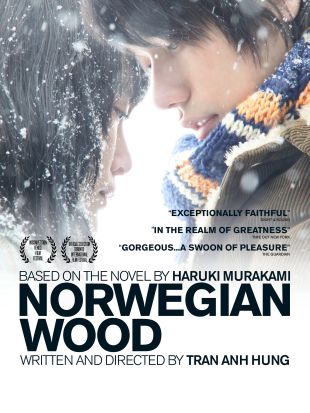
As an adaptation of Haruki Murakami's seminal 1987 novel, Norwegian Wood takes place in Japan over the course of a single pivotal year. The film observes the experiences of Toru Watanabe (Kenichi Matsuyama), a college student enrolled in a Tokyo university in 1968, as he comes of age and falls in love with a young woman for the first time. At the outset, Watanabe's friends, the inseparable romantic couple Kizuki (Kengo Kora) and Naoko (Rinko Kikuchi), encounter tragedy when Kizuki commits suicide for indeterminate reasons. Not long after, Watanabe and Naoko drift together and grow smitten. Though unforeseen complications arise, their love promises to endure.
Tran Anh Hung, the director of the masterly The Scent of Green Papaya, takes the reins for this filmization and wrote the script, and the film's very existence represents an act of formidable courage. To begin with, Murakami told his story in first person, filtered through Watanabe's young and not-always-knowing eyes, and the very presence of a camera entails significant risks -- it means stepping outside of the character, objectifying his reality. On top of that, the core essence of the drama (on page and screen) involves the subject's emotional growth and development, which, again, is intangible, not visible. And -- to be blunt -- these aren't exactly Henry Jaglom characters, prone to spilling out their hopes, fears, uncertainties, reservations, and affections to one another; they are arch, reserved, taciturn Japanese characters, as inward and inscrutable as one can imagine, with a much lower threshold than Westerners for any degree of emotional expression in their relationships.

For all of these reasons, it's perhaps a small miracle that Norwegian Wood works as beautifully and impeccably as it does. Though Hung retains patches of Watanabe's first-person narration, it doesn't place the audience on any firmer ground than it needs to; to the writer-director's complete credit, we remain suspended in an unstable balance, perched midway between phases of the story where we attain complete clarity of the situations before Watanabe's eyes, and phases in which the circumstances that befall him (particularly regarding Naoko's emotional needs) seem murky and opaque. This dynamic of cognizance versus lack of recognition sets up and sustains an unusual but wonderful tension in our minds. It also functions as a corollary, mirroring the instability of Watanabe's own sentience -- and that of many an adolescent. Everything attains sharp focus, however -- for him and for us -- in one central, defining moment when it becomes readily apparent that the young man must take charge of his life and emotions for the first time, literally running after the beleaguered, emotionally fragile Naoko and seizing her. Watanabe doesn't disappoint us.
Though the basic narrative ingredients of the film may read like melodrama, they don't manifest themselves as such here; Hung stretches the story out, in between pivotal events, with long, reflective periods of inactivity, which provide opportunities for us to more closely observe Watanabe's maturation and the various emotional gradations of his relationships with Naoko and a young woman named Midori (Kiko Mizuhara). To put it metaphorically: It's as if Hung presents us with a single, lovely rose, and then spends the time lingering over its various shadings and textures. The results are both fascinating and profound.
The themes of the picture also generate intrigue. One of Hung's central ideas (which seems both quintessential Murakami and intrinsically Japanese) involves loss -- how the cessation of a life or a relationship needn't constitute an end in and of itself, but can be perceived as a beginning, both a gateway and a catalyst. Accordingly, each loss in this film -- epitomized by Kizuki's suicide -- spurs a new relationship, new possibilities. And especially for Western audiences, this might introduce a new way of looking at the world and at life.
Best of all, the film gamely resists clichés and stays doggedly loyal to its characters and their passionate convictions. It's a masterly work, moving in its emotional sweep and marvelous in its specificity -- and it does almost complete justice to its source novel.
